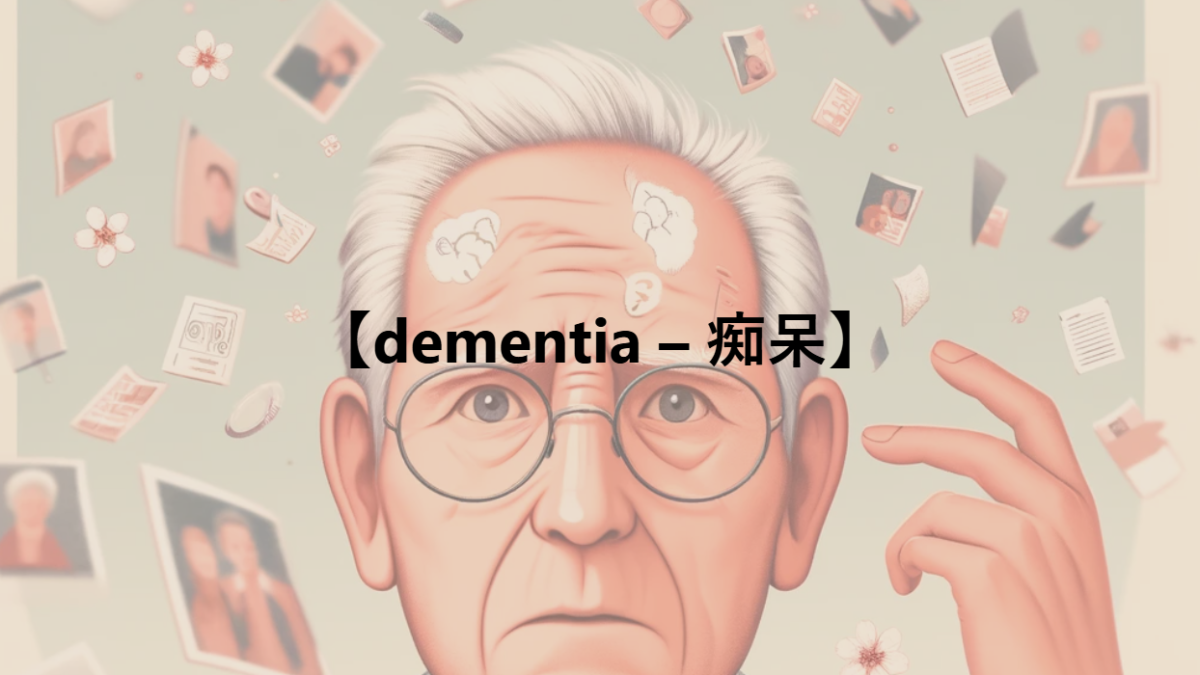語源・類義語・反対語・例文
【Dementia – 痴呆】という単語の語源とか由来を知っていますか?
「Dementia」はラテン語から来ており、元々は「de-」(離れる、ない)と「mens」(精神)から成り立っています。「De-」と「mens」を組み合わせることで、「mind away」(精神がなくなる)という意味が生まれ、「理性の喪失」や「狂気」を指すようになりました。
時間が経つにつれ、「dementia」という言葉は、記憶障害、思考能力の低下、判断力や言語能力の喪失など、さまざまな精神機能の低下を含む状態を指す医学用語として用いられるようになりました。現代では、アルツハイマー病を含むさまざまなタイプの痴呆を説明するために使われています。
The term “dementia” comes from Latin, originally composed of “de-” (away, off) and “mens” (mind). The combination of “de-” and “mens” leads to the meaning of “mind away,” signifying the loss of reasoning or madness.
Over time, the word “dementia” has evolved to refer to a medical condition characterized by a decline in memory, thinking abilities, judgment, and language skills, among other mental functions. Today, it is used to describe various types of dementia, including Alzheimer’s disease, indicating a condition involving significant cognitive decline.
この単語の類義語・反対語を教えてください。
類義語
- Cognitive decline(認知機能の低下): 認知能力が減退することを指しますが、痴呆と同様の意味で使われることがあります。
- Senility(老衰): 年齢に伴う認知機能の衰えを指すことがあり、痴呆と同様の状態を示す場合があります。
- Alzheimer’s disease(アルツハイマー病): 最も一般的な痴呆の形態で、記憶、思考、行動に重大な影響を及ぼします。
- Memory loss(記憶喪失): 痴呆の一症状であり、類義語として使われることがあります。
反対語
- Cognitive health(認知健康): 良好な記憶力、思考力、学習能力を保つ状態を指します。
- Mental acuity(精神の鋭さ): 思考や理解が明晰である状態を表します。
- Lucidity(明瞭さ、清明): 明確な思考や理解の能力を指します。
- Cognitive strength(認知力の強さ): 良好な認知機能や認知能力を指します。
この単語に似た単語で間違いやすい単語はありますか?
- Delirium(せん妄): 短期間に起こる急性の精神障害で、意識の混濁、注意力の低下、認識の障害が特徴です。せん妄は通常、体内の問題(例えば、感染症や薬の影響)によって引き起こされ、治療することで改善することが多いです。
- Depression(うつ病): 精神的な健康状態で、悲しみ、無力感、絶望感が特徴です。うつ病は痴呆とは異なり、感情や気分に関連していますが、痴呆を持つ人々の中にはうつ病を経験する人もいます。
- Amnesia(健忘症): 記憶の喪失を特徴とする状態です。健忘症は特定の事象や情報を記憶する能力が損なわれるが、他の認知機能は影響を受けない場合があります。
- Aphasia(失語症): 言語に関する障害で、話す能力、理解する能力、読む能力、書く能力が影響を受けることがあります。失語症は通常、脳の特定の部分が損傷を受けた結果生じます。
この単語を使った例文を5つほど教えてください。
My grandmother has been diagnosed with dementia, and her memory and cognitive abilities have significantly declined.
(祖母は痴呆症と診断され、彼女の記憶力と認知能力が著しく低下しました。)
The care facility provides specialized support for individuals with dementia to ensure their safety and well-being.
(介護施設は、痴呆症のある人々の安全と福祉を確保するために、専門的なサポートを提供しています。)
Researchers are studying potential treatments to slow down the progression of dementia and improve patients’ quality of life.
(研究者は、痴呆症の進行を遅らせ、患者の生活の質を向上させる可能性のある治療法について研究しています。)
Family members play a crucial role in supporting individuals with dementia and providing a familiar and structured environment.
(家族は、痴呆症のある人々を支え、馴染みのある環境と構造化された支援を提供する上で重要な役割を果たします。)
Dementia affects not only the individuals diagnosed but also their loved ones who may witness the gradual loss of their cognitive abilities.
(痴呆症は、診断された人だけでなく、認知能力の徐々の喪失を目撃するかもしれない彼らの愛する人々にも影響を与えます。)
【dementia – 痴呆】のコロケーション
- Early-onset dementia(早発性痴呆): 通常、65歳未満で発症する痴呆を指します。早期に発症することで、仕事や家庭生活に大きな影響を与えることがあります。
- Dementia care(痴呆ケア): 痴呆を持つ人々に対して提供されるケアや支援のことです。身体的、精神的なサポートはもちろん、日常生活の援助を含みます。
- Dementia symptoms(痴呆症状): 痴呆によって引き起こされる症状、例えば記憶喪失、判断力の低下、言語の問題などを指します。
- Dementia patient(痴呆患者): 痴呆症を患っている人を指します。これは医療の文脈でよく使われる表現です。
- Advanced dementia(進行性痴呆): 痴呆が進行し、患者さんが自立して生活することが困難になった状態を指します。この段階では、24時間体制のケアが必要になることがあります。
- Dementia diagnosis(痴呆診断): 痴呆を診断するプロセスや結果を指します。通常、医療専門家による様々なテストや評価を通じて行われます。
痴呆、または英語で言うところの「Dementia」は、さまざまな形で私たちの生活や社会に影響を及ぼします。今日は、この病とその周辺でよく使われる言葉やフレーズ、いわゆるコロケーションについて話をしてみましょう。
まず、痴呆には「早発性」という形があります。これは「Early-onset dementia」と表現され、主に65歳未満で発症する病を指します。若い年齢での発症は、個人の職業生活や家庭生活に大きな影響を与え、治療やケアの計画にも特別な考慮が必要です。
痴呆に関わるケア、つまり「Dementia care」は、この病を抱える人々が直面する多様な挑戦に対応するために欠かせません。このケアは、身体的な支援だけでなく、精神的なサポートや日常生活の援助を含みます。適切なケアが提供されることで、患者さんはより良い生活品質を維持することができます。
「Dementia symptoms」、つまり痴呆症状には、記憶の喪失、判断力の低下、言語能力の衰えなどがあります。これらの症状は、患者さん自身だけでなく、家族やケアギバーにとっても大きな挑戦となります。
「Dementia patient」は、この病を患っている人々を指します。痴呆は、ただ一人の患者に影響を及ぼすだけでなく、その家族、友人、そしてケアを提供する人々にも影響を及ぼします。
痴呆が進行すると、「Advanced dementia」という状態になります。この段階では、患者さんは一日中、包括的なケアを必要とするようになります。この時、コミュニケーションや基本的な日常活動のサポートが特に重要になります。
最後に、「Dementia diagnosis」、つまり痴呆診断は、この病を理解し、適切なケアや治療を行うための最初のステップです。医療専門家による詳細なテストや評価を通じて、痴呆の存在と種類を特定することができます。
痴呆は多面的な病であり、患者さんだけでなく、その周りの人々にも広範囲にわたる影響を及ぼします。だからこそ、私たちはこの病についてより深く理解し、効果的なケアとサポートを提供することが重要です。
Dementia, or “Dementia” as it’s known in English, affects our lives and society in various ways. Today, let’s talk about the words and phrases commonly associated with this condition, known as collocations, that are frequently used in the context of dementia.
First, there’s a form of dementia known as “Early-onset dementia.” This term refers to dementia that occurs in people under the age of 65. The onset of the condition at a younger age can have a significant impact on an individual’s professional and family life and requires special consideration in treatment and care planning.
Dementia care, or “Dementia care,” is indispensable in addressing the diverse challenges faced by individuals with this condition. This care includes not only physical support but also emotional support and assistance with daily activities. Providing appropriate care can help patients maintain a better quality of life.
“Dementia symptoms” include memory loss, impaired judgment, and diminished language abilities. These symptoms present significant challenges not only for the patients themselves but also for their families and caregivers.
A “Dementia patient” refers to individuals suffering from the condition. Dementia does not only affect the patient but also impacts their families, friends, and those who provide care.
As dementia progresses, it leads to a condition known as “Advanced dementia.” At this stage, patients require comprehensive care throughout the day. Support for communication and basic daily activities becomes especially important at this time.
Lastly, “Dementia diagnosis” is the first step in understanding and managing the condition effectively. Through detailed testing and assessment by medical professionals, the presence and type of dementia can be identified.
Dementia is a multifaceted condition that not only affects the patient but also has a wide-ranging impact on those around them. Therefore, it’s crucial that we deepen our understanding of this condition and provide effective care and support.
文法問題: “dementia” (認知症)
- 品詞と使い方:
The elderly patient was diagnosed with _, a condition that affects memory and cognitive function.
(A) dement
(B) demented
(C) dementia
(D) dementing
解答と解説: (C) dementia
空欄には、診断された病気の名前が入るため、名詞が必要です。dementia は「認知症」という意味の名詞です。
– - 形容詞形:
The _ patient struggled to remember the names of his family members.
(A) dement
(B) demented
(C) dementia
(D) dementing
解答と解説: (B) demented
空欄には名詞 patient を修飾する形容詞が必要です。demented は「認知症の」という意味の形容詞です。
– - 関連語句:
The doctor recommended a brain scan to rule out other possible causes of the patient’s _.
(A) dementia
(B) Alzheimer’s disease
(C) cognitive impairment
(D) all of the above
解答と解説: (D) all of the above
dementia, Alzheimer’s disease, cognitive impairment はいずれも認知機能の低下に関連する言葉であり、この文脈ではすべて適切です。
– - 誤文訂正:
The dementias is a progressive disease that affects millions of people worldwide.
解答と解説: dementias → dementia
dementia は不可算名詞なので、複数形の dementias は誤りです。
– - 文脈に合った形:
The family sought support and resources to help them cope with their loved one’s _.
(A) dement
(B) demented
(C) dementia
(D) dementing
解答と解説: (C) dementia
空欄には、前置詞 with の目的語となる名詞が必要です。dementia は「認知症」という意味の名詞です。

